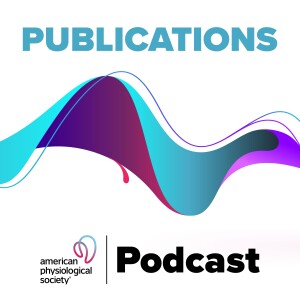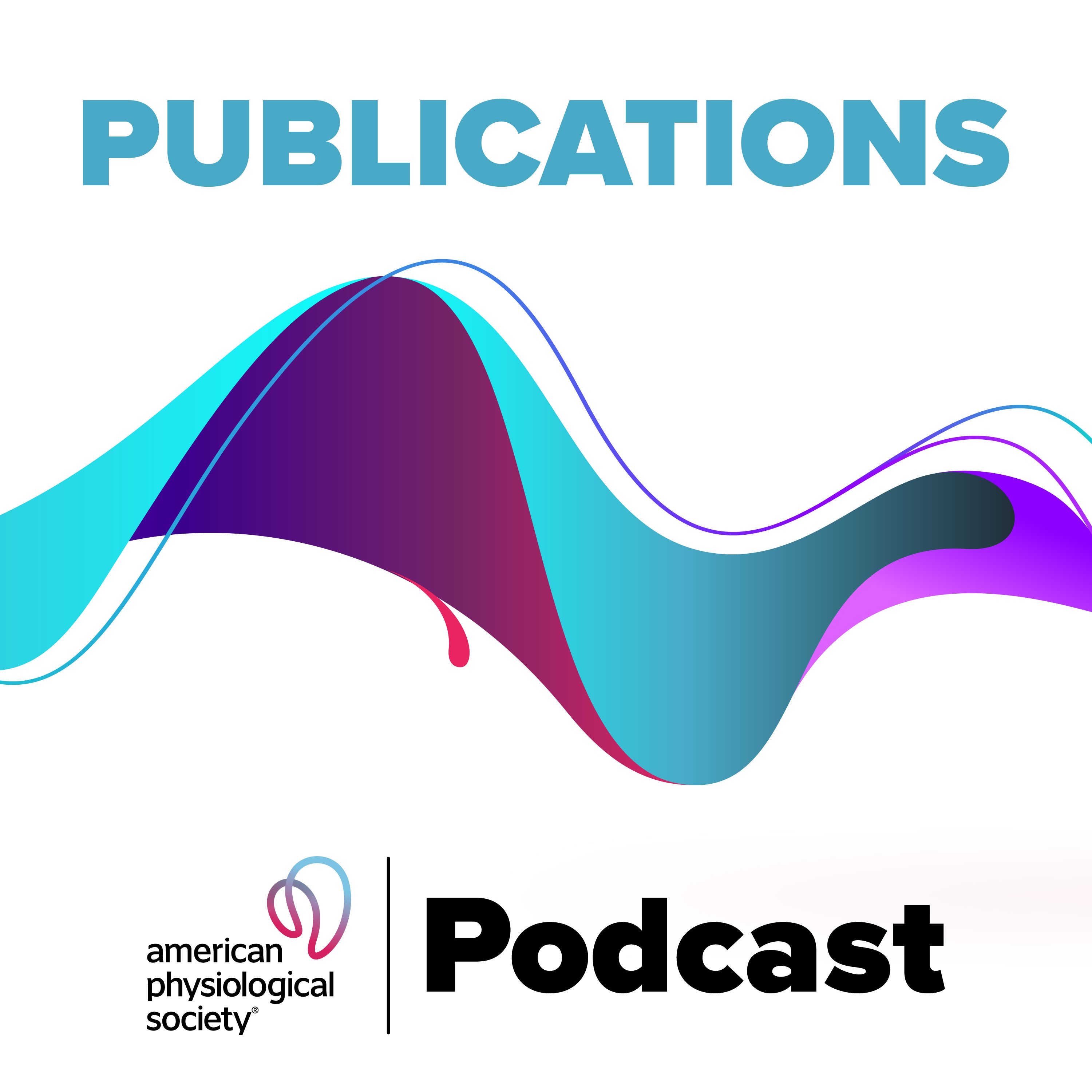Episodes

Tuesday Apr 22, 2025
Interorgan Insights: Digital Twinning of Interorgan Communications
Tuesday Apr 22, 2025
Tuesday Apr 22, 2025
In this episode of The APS Publications podcast featuring Comprehensive Physiology, we hear from Dr. Lance Fortnow (Illinois Institute of Technology) about his recent Review exploring how artificial intelligence (AI) can play a role in digital twinning of interorgan communication. The human body is an extremely complex system with constant interorgan communication, and AI has been proven effective at modeling complex systems and understanding communication. A digital twin is a complete simulation of a physical process, providing a unique opportunity to simulate real-world physiology and pathophysiological conditions such as aging and various disease states. What role might digital twinning play in researching the effectiveness of therapeutic interventions? Can digital twinning provide a platform for both early career and senior researchers to take a holistic interorgan approach to treating disease? Listen now to find out.
Lance Fortnow Digital Twinning of Interorgan Communications Comprehensive Physiology, published February 9, 2025. DOI: doi.org/10.1002/cph4.70002

Friday Apr 04, 2025
Exploring Estradiol, Pulse Wave Velocity, and PTSD in Trauma-Exposed Women
Friday Apr 04, 2025
Friday Apr 04, 2025
In this episode of the APS Publications Podcast, we’re joined by coauthors Chasity Corbin, Chowdhury Ibtida Tahmin, and Ida T. Fonkoue to discuss their research titled "Estradiol levels are differentially associated with pulse wave velocity in trauma-exposed premenopausal women with and without PTSD." The study investigates how serum estradiol (E2) levels influence pulse wave velocity (PWV) in premenopausal women exposed to trauma, with a particular focus on the impact of posttraumatic stress disorder (PTSD). The researchers discovered that E2 levels predicted PWV only in women without PTSD, even after accounting for factors like menstrual cycle phase, age, body mass index, diastolic blood pressure, and PTSD symptom severity. Additionally, the study found that E2 levels were significantly lower in women with PTSD. Tune in as our guests dive into the details of this important study.
American Journal of Physiology-Regulatory, Integrative and Comparative Physiology 2025 328:3, R235-R241

Friday Mar 28, 2025
Friday Mar 28, 2025
In this episode of The APS Publications Podcast, featuring Advances in Physiology Education coauthors Baylee A. Edwards and Sara E. Brownell discuss their educational research titled "Students respond positively to an instructor collecting and sharing aggregated class demographic data from a survey in a high-enrollment physiology course." This study delves into undergraduate students' perceptions of a high-enrollment physiology course instructor gathering and sharing aggregated demographic data to foster inclusivity. Most students responded positively to this approach, with particular benefits noted by women, nonbinary students, and liberal-leaning students. Edwards and Brownell's findings suggest that collecting and sharing student demographic data in an aggregate form could be an effective strategy to strengthen student-instructor relationships and promote inclusion in large science courses. Tune in to hear more about this impactful research and its potential to transform high-enrollment classrooms.
Advances in Physiology Education 2024 48:4, 836-856

Friday Mar 14, 2025
Exploring Epinephrine's Role in EPO Gene Activation During Hypoxia
Friday Mar 14, 2025
Friday Mar 14, 2025
In this episode of The APS Publications Podcast, featuring AJP-Regulatory, Integrative and Comparative Physiology, coauthors Xiaoyu Su and Nanduri R. Prabhakar dive into their recently published research titled "Adrenal Epinephrine Facilitates Erythropoietin Gene Activation by Hypoxia Through β2 Adrenergic Receptor Interaction with Hif-2α." The study explores the role of sympathetic nervous system (SNS) activation in erythropoietin (EPO) gene expression during hypobaric hypoxia, shedding light on how adrenal epinephrine, via β2 adrenergic receptors, interacts with the transcription factor HIF-2α to enhance EPO gene activation. Tune in as they highlight the breakthrough findings that deepen our understanding of the physiological mechanisms underlying hypoxia-induced gene regulation.
American Journal of Physiology-Regulatory, Integrative and Comparative Physiology 2025 328:1, R75-R80

Tuesday Mar 11, 2025
Advancing Inclusive Education in Reproductive Physiology
Tuesday Mar 11, 2025
Tuesday Mar 11, 2025
In this episode of The APS Publications Podcast, featuring Advances in Physiology Education coauthors Nicholas Fimognari, Leaf R. Kardol, and Caitlin S. Wyrwoll discuss their published paper, “Inclusion of Genital, Sexual, and Gender Diversity in Human Reproductive Teaching: Impact on Student Experience and Recommendations for Tertiary Educators.”
The coauthors outline key teaching innovations aimed at improving inclusivity in reproductive biology and physiology education. By enhancing representation of genital, sexual, and gender diversity in the curriculum, these advancements play a crucial role in shaping the perspectives of future medical professionals and researchers. Tune in as the coauthors explore how inclusive teaching practices can positively impact student experiences and ultimately contribute to more equitable healthcare and research.
Advances in Physiology Education 2024 48:4, 698-703

Tuesday Mar 04, 2025
Tuesday Mar 04, 2025
Glucagon-like peptide-1 (GLP-1), a hormone released from enteroendocrine cells in the distal small and large intestines in response to nutrients and other stimuli, not only controls eating and insulin release, but is also involved in drinking control as well as renal and cardiovascular functions. This review from Comprehensive Physiology details GLP-1's roles in these interconnected systems, highlighting recent findings and unresolved issues, and integrating them to discuss the physiological and pathological relevance of endogenous GLP-1 in coordinating these functions.
Glucagon-Like Peptide-1 Links Ingestion, Homeostasis, and the Heart.
Jean-Philippe Krieger, Derek Daniels, Shin Lee, Svetlana Mastitskaya, Wolfgang Langhans. Comprehensive Physiology 15: e7. https://doi.org/10.1002/cph4.7

Monday Mar 03, 2025
Don't Sleep on Vitamin D
Monday Mar 03, 2025
Monday Mar 03, 2025
In this episode of The APS Publications Podcast, featuring AJP-Regulatory, Integrative and Comparative Physiology, join coauthors Austin Robinson and Meral Culver as they delve into their recently published research titled "Do Not Sleep on Vitamin D: Vitamin D is Associated with Sleep Variability in Apparently Healthy Adults." The study explores the intriguing connection between vitamin D levels and sleep health, revealing that individuals with lower circulating vitamin D concentrations experience greater sleep variability compared to those with higher levels. Tune in to learn about the growing body of evidence suggesting an important link between vitamin D status and sleep quality.
American Journal of Physiology-Regulatory, Integrative and Comparative Physiology 2025 328:3, R262-R273

Thursday Jan 23, 2025
Thursday Jan 23, 2025
In this episode of The APS Publications Podcast, join Tasneem F. Mohammed, Nolina Doud, Sara E. Brownell, and Katelyn M. Cooper as they discuss their recently published paper, "The Upside to Depression: Undergraduates Benefit from an Instructor Revealing Depression in a Large-Enrollment Physiology Course." In the study, an instructor of a large physiology course openly disclosed her depression to students on two separate occasions. The research explores how this revelation impacted students' perceptions of the instructor, the classroom environment, and their overall experience.
Through a survey of 289 undergraduates, the study found that most students remembered the disclosure, with a significant majority reporting a positive impact. The findings show that for some groups, such as women, LGBTQ+ students, and those with more severe depressive symptoms, the disclosure helped normalize depression and fostered a more inclusive and approachable learning atmosphere. This conversation delves into the implications of instructors revealing their own struggles with mental health, challenging the stigma around depression, and offering new perspectives on building supportive and inclusive educational spaces.
Tune in for a thought-provoking discussion on the power of vulnerability in teaching and its potential to transform student experiences.
Advances in Physiology Education 2024 48:4, 884-897

